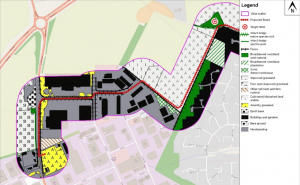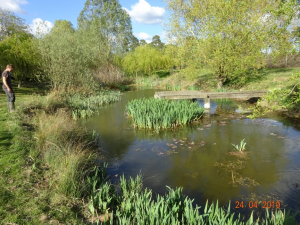A new water pipeline at Thetford
In 2018 Wild Frontier Ecology undertook an extended Phase 1 habitat survey along a proposed water pipeline route around Thetford in Norfolk. The route was proposed to go through an industrial estate, agricultural fields, pastures, grasslands, hedges and trees.
To assess the habitats along the route, and the potential for any impacts on protected species, Wild Frontier Ecology first carried out a desk survey. This comprised a search for conservation sites within 2km of the proposed route and a data search with the Norfolk Biodiversity Information Service for species records. Fourteen statutorily designated nature conservation sites and 16 County Wildlife Sites were found with three of the County Wildlife Sites directly intersecting the route. 6,450 species records, including reptiles and a variety of bird species were also found within the 2km buffer.
Next the route was subject to a walkover survey where all habitats within a 100-250m buffer of the proposed pipeline were mapped and considered for their potential to host protected species such as great crested newts, reptiles and stone curlews. Ponds were also recorded and assessed for their suitability for great crested newts.
Based on the findings of the habitat survey, the client was advised that further great crested newt, reptile and stone curlew surveys should be undertaken to ensure impacts on these species were fully considered. No great crested newts were found in any of the surveyed ponds, a population of grass snakes was recorded at one County Wildlife Site and a stone curlew nest recorded just to the north of the route.
Subsequent advice on how to avoid the recorded ecological features allowed the client to opt for directionally drilling under the County Wildlife Sites.
Wild Frontier’s final report then summarised the anticipated ecological impacts for the purposes of planning. Tailored construction methods and seasonal restrictions to the work were advised based on the survey findings. Altogether the package of survey works and clear practical advice meant that the project was assessed to have a neutral ecological impact in the long term, fulfilling the client’s ecological obligations.


